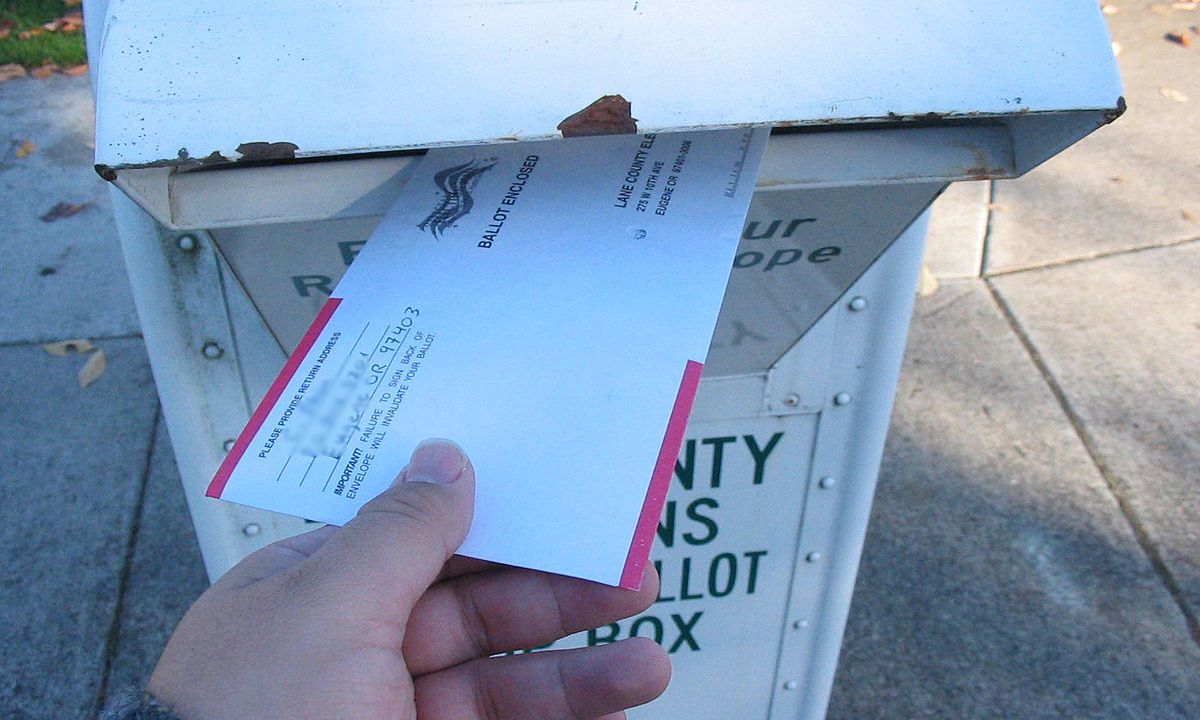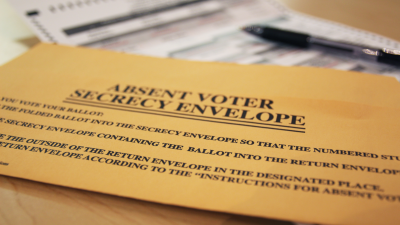
A voter returns his vote-by-mail ballot in the 2006 General elections in Lane County, Oregon. (CC 2.0, Flickr)
This post first appeared at the Brennan Center blog.
As the coronavirus looms over the 2020 election, President Trump has begun to attack vote by mail. Unfortunately for him, that’s a losing argument. A strong majority of Americans — including 57 percent of Republicans — want the opportunity to safely cast their votes by mail without having to wait in long lines or crowds.
A new Brennan Center poll finds that four out of five Americans believe states should give all voters the option of unexcused mail ballots during the November election. The poll, conducted by the Benenson Strategy Group between March 22 and 24, reached a representative sample of 1,550 adults, 90 percent of whom were registered voters. Our poll tracks a recent Reuters/Ipsos poll that found 72 percent of Americans, including 65 percent of Republicans, want a mail ballot option for November 3.
Vote by mail is only one solution. It would not be possible to shift to this exclusively nationwide by November, even if it were a good idea. Many voters want or need to vote in person. Election Day itself, of course, cannot be postponed without a new federal statute — and that would be utterly illegitimate. There must be ample early voting opportunities nationwide. That, too, is broadly popular, according to the new Brennan Center poll. Two-thirds of Americans — including 43 percent of Republicans and 65 percent of independents — also support allowing Election Day to take place over a time period of as much as two weeks to ensure that no one has to wait in long lines.
This, of course, makes sense: Americans do not want to put their health in jeopardy by going to crowded polling places if the virus has a resurgence this fall. Trump, however, sees a dark conspiracy afoot. He says vote by mail creates a “[t]remendous potential voter fraud” and that it “doesn’t work out well for Republicans.”
Much of the country already votes by mail ballots with infinitesimal fraud. Five states run their elections almost entirely by vote by mail. In 28 states and the District of Columbia, voters have the right to request a no-excuse absentee ballot. In some of these states — including California and Arizona — most citizens vote from home.
There is also no evidence that vote by mail benefits one party more than another. It’s used in Republican Utah and narrowly divided Colorado. Conservative publications and groups, such as the Washington Times, National Review, and the American Enterprise Institute, have published pieces in favor of vote by mail. If the president believes vote by mail is “corrupt,” he has a funny way of showing it.
President Trump: “I think mail-in voting is horrible, it’s corrupt.”
Reporter: “You voted by mail in Florida’s election last month, didn’t you?”
Trump: “Sure. I can vote by mail”
Reporter: “How do you reconcile with that?”
Trump: “Because I’m allowed to.” pic.twitter.com/Es8ZNyB3O1
— MSNBC (@MSNBC) April 7, 2020
In any case, we have no choice.
Wisconsin shows what can happen all across the country in November. In the Badger State, voters can cast ballots by mail, but the volume of last-minute requests swelled the number of mail ballots issued to nearly 1.3 million from around 250,000 four years ago, overwhelming the system. The state’s conservative supreme court then blocked the governor’s move to postpone voting, and the U.S. Supreme Court overturned a lower court decision that would have allowed more ballots to be counted. In Milwaukee, the number of polling places dropped from 178 to 5. Primary day saw the horrifying specter of people risking their health to wait in line to vote.
Congress has a chance to avoid more debacles in November. The Brennan Center has issued a plan for a free, fair, secure, and safe election in 2020. We’ve estimated the cost: at least $2 billion — and that’s just for November. Congress acted in the third coronavirus stimulus bill, appropriating $400 million to go to states to help them prepare. Now Congress must do more, appropriating all needed funds. States have limited time to get ready.
Without action, it’s hard to escape the conclusion that the president and his acolytes hope to use the crisis to collapse turnout. If they do, they will discover they are running up against a solid wall of support for needed voting changes — support from Republicans, Democrats, and independents. Voters want to vote. Politicians should let them.
For more Brennan Center news, connect with them on Facebook and Twitter.




